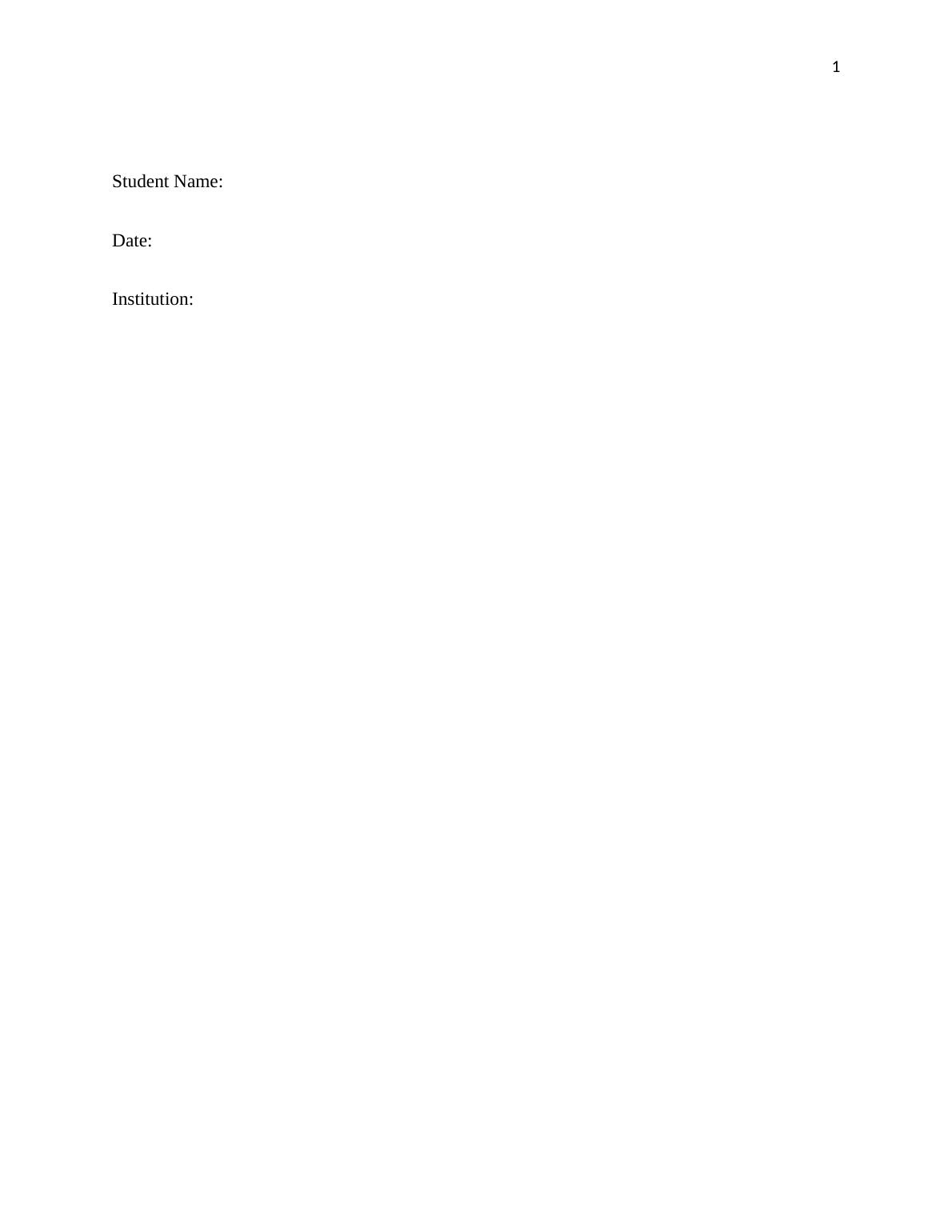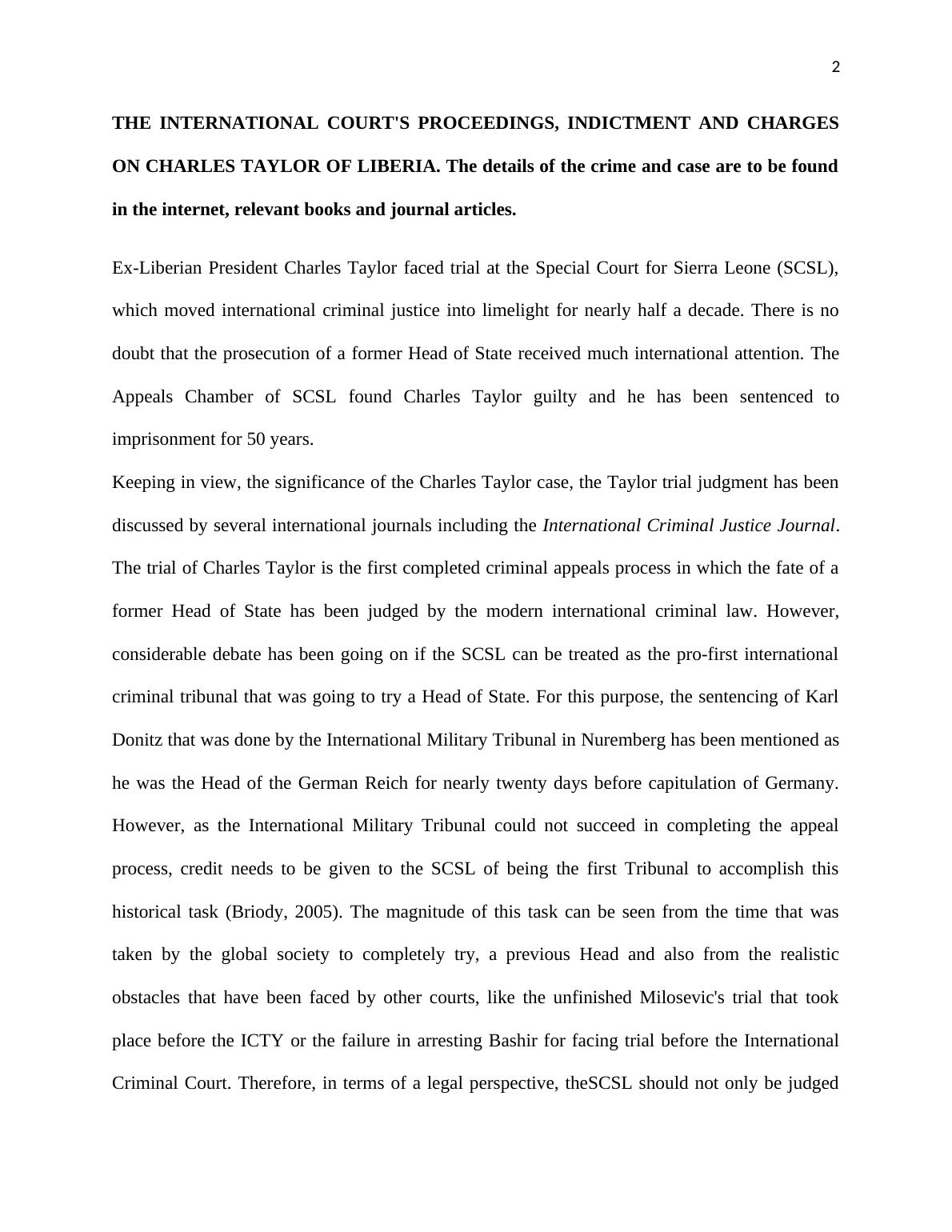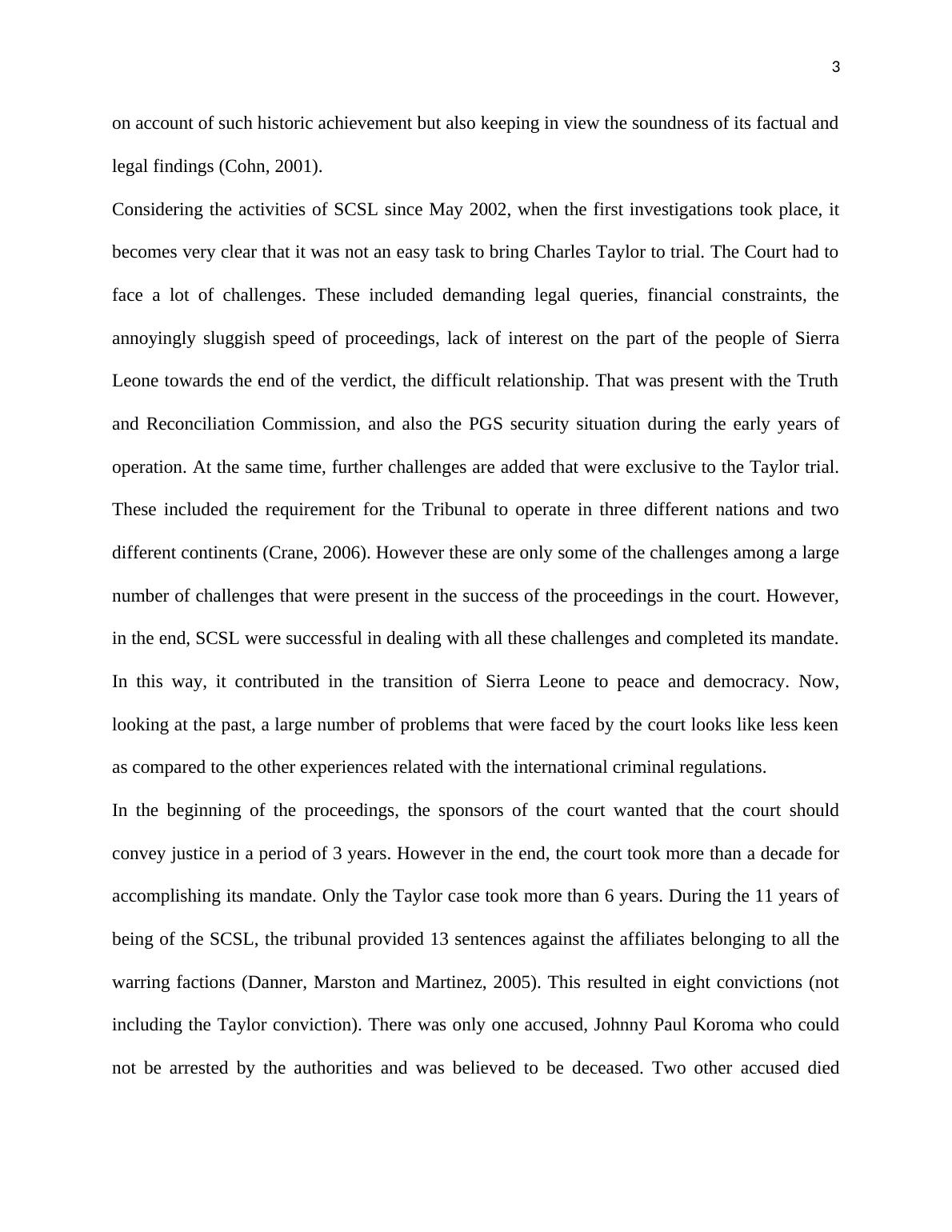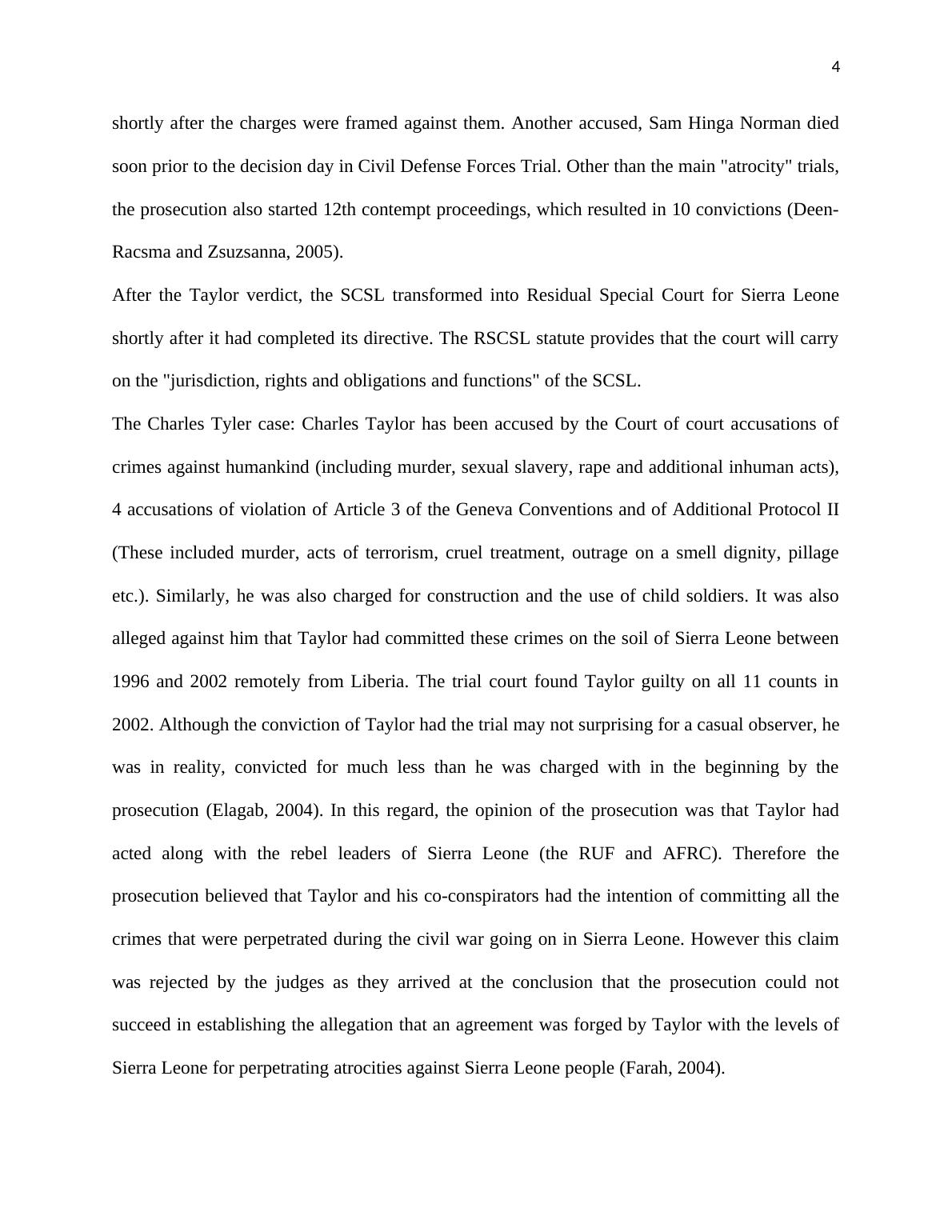International Court Proceedings on Charles Taylor of Liberia
Added on 2023-06-03
11 Pages3215 Words217 Views
1
Student Name:
Date:
Institution:
Student Name:
Date:
Institution:

2
THE INTERNATIONAL COURT'S PROCEEDINGS, INDICTMENT AND CHARGES
ON CHARLES TAYLOR OF LIBERIA. The details of the crime and case are to be found
in the internet, relevant books and journal articles.
Ex-Liberian President Charles Taylor faced trial at the Special Court for Sierra Leone (SCSL),
which moved international criminal justice into limelight for nearly half a decade. There is no
doubt that the prosecution of a former Head of State received much international attention. The
Appeals Chamber of SCSL found Charles Taylor guilty and he has been sentenced to
imprisonment for 50 years.
Keeping in view, the significance of the Charles Taylor case, the Taylor trial judgment has been
discussed by several international journals including the International Criminal Justice Journal.
The trial of Charles Taylor is the first completed criminal appeals process in which the fate of a
former Head of State has been judged by the modern international criminal law. However,
considerable debate has been going on if the SCSL can be treated as the pro-first international
criminal tribunal that was going to try a Head of State. For this purpose, the sentencing of Karl
Donitz that was done by the International Military Tribunal in Nuremberg has been mentioned as
he was the Head of the German Reich for nearly twenty days before capitulation of Germany.
However, as the International Military Tribunal could not succeed in completing the appeal
process, credit needs to be given to the SCSL of being the first Tribunal to accomplish this
historical task (Briody, 2005). The magnitude of this task can be seen from the time that was
taken by the global society to completely try, a previous Head and also from the realistic
obstacles that have been faced by other courts, like the unfinished Milosevic's trial that took
place before the ICTY or the failure in arresting Bashir for facing trial before the International
Criminal Court. Therefore, in terms of a legal perspective, theSCSL should not only be judged
THE INTERNATIONAL COURT'S PROCEEDINGS, INDICTMENT AND CHARGES
ON CHARLES TAYLOR OF LIBERIA. The details of the crime and case are to be found
in the internet, relevant books and journal articles.
Ex-Liberian President Charles Taylor faced trial at the Special Court for Sierra Leone (SCSL),
which moved international criminal justice into limelight for nearly half a decade. There is no
doubt that the prosecution of a former Head of State received much international attention. The
Appeals Chamber of SCSL found Charles Taylor guilty and he has been sentenced to
imprisonment for 50 years.
Keeping in view, the significance of the Charles Taylor case, the Taylor trial judgment has been
discussed by several international journals including the International Criminal Justice Journal.
The trial of Charles Taylor is the first completed criminal appeals process in which the fate of a
former Head of State has been judged by the modern international criminal law. However,
considerable debate has been going on if the SCSL can be treated as the pro-first international
criminal tribunal that was going to try a Head of State. For this purpose, the sentencing of Karl
Donitz that was done by the International Military Tribunal in Nuremberg has been mentioned as
he was the Head of the German Reich for nearly twenty days before capitulation of Germany.
However, as the International Military Tribunal could not succeed in completing the appeal
process, credit needs to be given to the SCSL of being the first Tribunal to accomplish this
historical task (Briody, 2005). The magnitude of this task can be seen from the time that was
taken by the global society to completely try, a previous Head and also from the realistic
obstacles that have been faced by other courts, like the unfinished Milosevic's trial that took
place before the ICTY or the failure in arresting Bashir for facing trial before the International
Criminal Court. Therefore, in terms of a legal perspective, theSCSL should not only be judged

3
on account of such historic achievement but also keeping in view the soundness of its factual and
legal findings (Cohn, 2001).
Considering the activities of SCSL since May 2002, when the first investigations took place, it
becomes very clear that it was not an easy task to bring Charles Taylor to trial. The Court had to
face a lot of challenges. These included demanding legal queries, financial constraints, the
annoyingly sluggish speed of proceedings, lack of interest on the part of the people of Sierra
Leone towards the end of the verdict, the difficult relationship. That was present with the Truth
and Reconciliation Commission, and also the PGS security situation during the early years of
operation. At the same time, further challenges are added that were exclusive to the Taylor trial.
These included the requirement for the Tribunal to operate in three different nations and two
different continents (Crane, 2006). However these are only some of the challenges among a large
number of challenges that were present in the success of the proceedings in the court. However,
in the end, SCSL were successful in dealing with all these challenges and completed its mandate.
In this way, it contributed in the transition of Sierra Leone to peace and democracy. Now,
looking at the past, a large number of problems that were faced by the court looks like less keen
as compared to the other experiences related with the international criminal regulations.
In the beginning of the proceedings, the sponsors of the court wanted that the court should
convey justice in a period of 3 years. However in the end, the court took more than a decade for
accomplishing its mandate. Only the Taylor case took more than 6 years. During the 11 years of
being of the SCSL, the tribunal provided 13 sentences against the affiliates belonging to all the
warring factions (Danner, Marston and Martinez, 2005). This resulted in eight convictions (not
including the Taylor conviction). There was only one accused, Johnny Paul Koroma who could
not be arrested by the authorities and was believed to be deceased. Two other accused died
on account of such historic achievement but also keeping in view the soundness of its factual and
legal findings (Cohn, 2001).
Considering the activities of SCSL since May 2002, when the first investigations took place, it
becomes very clear that it was not an easy task to bring Charles Taylor to trial. The Court had to
face a lot of challenges. These included demanding legal queries, financial constraints, the
annoyingly sluggish speed of proceedings, lack of interest on the part of the people of Sierra
Leone towards the end of the verdict, the difficult relationship. That was present with the Truth
and Reconciliation Commission, and also the PGS security situation during the early years of
operation. At the same time, further challenges are added that were exclusive to the Taylor trial.
These included the requirement for the Tribunal to operate in three different nations and two
different continents (Crane, 2006). However these are only some of the challenges among a large
number of challenges that were present in the success of the proceedings in the court. However,
in the end, SCSL were successful in dealing with all these challenges and completed its mandate.
In this way, it contributed in the transition of Sierra Leone to peace and democracy. Now,
looking at the past, a large number of problems that were faced by the court looks like less keen
as compared to the other experiences related with the international criminal regulations.
In the beginning of the proceedings, the sponsors of the court wanted that the court should
convey justice in a period of 3 years. However in the end, the court took more than a decade for
accomplishing its mandate. Only the Taylor case took more than 6 years. During the 11 years of
being of the SCSL, the tribunal provided 13 sentences against the affiliates belonging to all the
warring factions (Danner, Marston and Martinez, 2005). This resulted in eight convictions (not
including the Taylor conviction). There was only one accused, Johnny Paul Koroma who could
not be arrested by the authorities and was believed to be deceased. Two other accused died

4
shortly after the charges were framed against them. Another accused, Sam Hinga Norman died
soon prior to the decision day in Civil Defense Forces Trial. Other than the main "atrocity" trials,
the prosecution also started 12th contempt proceedings, which resulted in 10 convictions (Deen-
Racsma and Zsuzsanna, 2005).
After the Taylor verdict, the SCSL transformed into Residual Special Court for Sierra Leone
shortly after it had completed its directive. The RSCSL statute provides that the court will carry
on the "jurisdiction, rights and obligations and functions" of the SCSL.
The Charles Tyler case: Charles Taylor has been accused by the Court of court accusations of
crimes against humankind (including murder, sexual slavery, rape and additional inhuman acts),
4 accusations of violation of Article 3 of the Geneva Conventions and of Additional Protocol II
(These included murder, acts of terrorism, cruel treatment, outrage on a smell dignity, pillage
etc.). Similarly, he was also charged for construction and the use of child soldiers. It was also
alleged against him that Taylor had committed these crimes on the soil of Sierra Leone between
1996 and 2002 remotely from Liberia. The trial court found Taylor guilty on all 11 counts in
2002. Although the conviction of Taylor had the trial may not surprising for a casual observer, he
was in reality, convicted for much less than he was charged with in the beginning by the
prosecution (Elagab, 2004). In this regard, the opinion of the prosecution was that Taylor had
acted along with the rebel leaders of Sierra Leone (the RUF and AFRC). Therefore the
prosecution believed that Taylor and his co-conspirators had the intention of committing all the
crimes that were perpetrated during the civil war going on in Sierra Leone. However this claim
was rejected by the judges as they arrived at the conclusion that the prosecution could not
succeed in establishing the allegation that an agreement was forged by Taylor with the levels of
Sierra Leone for perpetrating atrocities against Sierra Leone people (Farah, 2004).
shortly after the charges were framed against them. Another accused, Sam Hinga Norman died
soon prior to the decision day in Civil Defense Forces Trial. Other than the main "atrocity" trials,
the prosecution also started 12th contempt proceedings, which resulted in 10 convictions (Deen-
Racsma and Zsuzsanna, 2005).
After the Taylor verdict, the SCSL transformed into Residual Special Court for Sierra Leone
shortly after it had completed its directive. The RSCSL statute provides that the court will carry
on the "jurisdiction, rights and obligations and functions" of the SCSL.
The Charles Tyler case: Charles Taylor has been accused by the Court of court accusations of
crimes against humankind (including murder, sexual slavery, rape and additional inhuman acts),
4 accusations of violation of Article 3 of the Geneva Conventions and of Additional Protocol II
(These included murder, acts of terrorism, cruel treatment, outrage on a smell dignity, pillage
etc.). Similarly, he was also charged for construction and the use of child soldiers. It was also
alleged against him that Taylor had committed these crimes on the soil of Sierra Leone between
1996 and 2002 remotely from Liberia. The trial court found Taylor guilty on all 11 counts in
2002. Although the conviction of Taylor had the trial may not surprising for a casual observer, he
was in reality, convicted for much less than he was charged with in the beginning by the
prosecution (Elagab, 2004). In this regard, the opinion of the prosecution was that Taylor had
acted along with the rebel leaders of Sierra Leone (the RUF and AFRC). Therefore the
prosecution believed that Taylor and his co-conspirators had the intention of committing all the
crimes that were perpetrated during the civil war going on in Sierra Leone. However this claim
was rejected by the judges as they arrived at the conclusion that the prosecution could not
succeed in establishing the allegation that an agreement was forged by Taylor with the levels of
Sierra Leone for perpetrating atrocities against Sierra Leone people (Farah, 2004).

End of preview
Want to access all the pages? Upload your documents or become a member.
Related Documents
International Court Proceedings, Indictment and Charges on Charles Taylor of Liberia | Deskliblg...
|15
|3754
|496
Nuremberg Trials: Crimes Against Peace, War Crimes, and Crimes Against Humanitylg...
|9
|2450
|161
(solved) Assignment on Criminal Lawlg...
|10
|2416
|64
Assignment on Criminal Law - NACDLlg...
|4
|733
|19
Court Ethnography: Division of Powers, Access, Characteristics, and Observationslg...
|8
|2391
|303
Criminal Justice Process and Stakeholderslg...
|9
|2750
|29